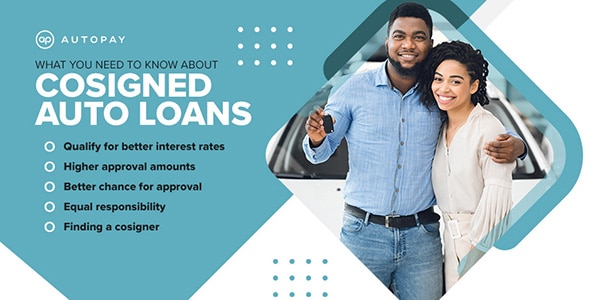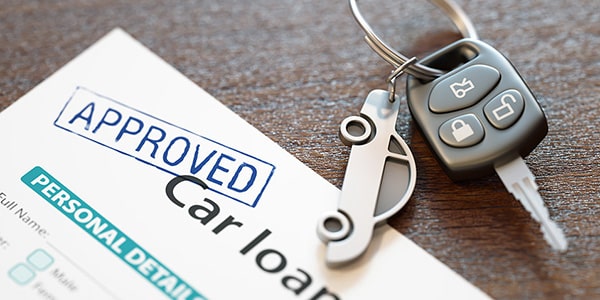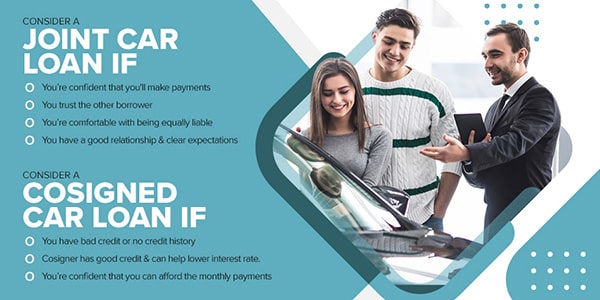You finally decided it’s time for a new car. That’s fantastic. You’re certainly not alone with more than 272.4 million privately owned vehicles on American city streets. Your next step is to explore your options for financing the purchase.
And if you’re married, in a domestic partnership or want to explore all your options, you might wonder if it makes sense to take out a joint or cosigned auto loan.
What’s the Difference Between a Joint and Cosigned Auto Loan?
Before you start shopping for your new car, it’s important to understand the difference between joint and cosigned auto financing options.
A joint auto loan is when two people take out a loan together to purchase a car. Both borrowers, or co-borrowers, are responsible for making the monthly payments on the loan and have equal ownership in the car. In addition, they are equally responsible for the debt if either borrower stops making payments on the loan and defaults.
A cosigned auto loan is when one person (the cosigner) agrees to be financially responsible for another person’s (the borrower’s) debt if they default on their loan. The cosigner acts as a guarantor for the lender if the borrower can’t repay their debt. They also have no ownership rights to the car.
Both choices have pros and cons, so you must choose the right one for your unique financial situation.
We’ll help you make an informed decision so that when it’s time to sign on the dotted line, you’ll be confident that you’ve chosen the best option.
Is It Better to Apply for a Car Loan Jointly?
When deciding to take out a joint auto loan with a co-borrower, there are a few key things to remember. We’ve identified two pros and two possible cons to take into account.

Pro: Lower interest rates
Applying for an auto loan with a co-borrower can help you qualify for a lower interest rate. This is because lenders view joint borrowers as less risky than individual borrowers. Having two incomes also makes it more likely that you’ll be able to afford the monthly payments on the loan.
Likewise, both credit scores will be considered when qualifying for the loan, so if one borrower has a poor credit score, the other borrower’s good credit score might help offset that.
Pro: Build a positive credit history
A joint auto loan can help you improve your credit score. This is because the monthly payments will be reported to all three major credit bureaus (Experian, Equifax and TransUnion). So, as long as both borrowers make their payments on time each month, their credit scores will gradually improve.
This is an excellent move for situations when one borrower has little to no credit history. By taking out a joint auto loan and making timely payments, that borrower can begin to establish a good credit history. In addition, this will help with future borrowing needs, such as taking out a mortgage.
Con: Equal ownership can leave one borrower responsible
Both borrowers own the vehicle and are equally responsible for repaying the debt since ownership is jointly held. But if one borrower ceases to make their share of payments on the loan, the other borrower will still be on the hook for the whole of the balance. This can strain relationships, especially if the other borrower can’t afford to make up the difference.
Con: Ending a joint auto loan can be difficult
If you and your co-borrower have decided you want to end your joint auto loan before the loan is paid off, you have two options.
The first is auto refinancing in one borrower’s name only. In this situation, the borrower keeping the vehicle will need to qualify independently for the new loan based on their individual income, credit score and employment history. To decide if that’s a good idea, start by plugging your numbers into a refinance car loan calculator to see what your rates will be.
The other option is to sell the car and pay off the loan with the proceeds from the sale. But this isn’t always easy, particularly if you’re upside down on the loan, meaning you owe more than the car is worth.
If this is the case, you might need to bring money to the table at closing to pay off the remaining loan balance. Some people think GAP insurance will help them in these situations, but remember that it’s designed to cover you in cases where your vehicle is stolen or totaled, not for voluntary sales.
Is It Better to Finance a Car With a Cosigner?
Taking out an auto loan with a cosigner might be the best option if you have bad credit or no credit history. But it does require finding someone comfortable with the risk and willing to help you finance a car. Here are three pros and two cons to consider before applying for a cosigned loan.

Pro: Qualify for better interest rates
One advantage of having a cosigner on your auto loan is that it can help you qualify for a lower interest rate. Similar to joint auto loans, this is because lenders, like a bank, credit union or auto loan company, see cosigned loans as less of a risk than individual loans.
In this situation, your cosigner’s good credit score will be factored in when qualifying for the loan, which can help offset any negatives in your credit history.
Pro: Higher approval amounts
Another advantage of having a cosigner is that it can help you secure a higher loan approval amount. This is because the cosigner’s income and employment history will be considered when determining how much you can borrow. So, if your cosigner has a good income and a stable job, this might help increase the amount you’re approved for.
Pro: Better chance for approval
A final advantage of having a cosigner is that it can help you get approved for financing in the first place. This is especially helpful if you have bad credit or no credit history. That’s because most lenders won’t approve anyone for an auto loan unless they have good credit or someone else to cosign for them.
Con: Equal responsibility
The main downside of having a cosigner on your auto loan is that they’re equally responsible for repaying your debt if you default on your loan. So, if you can’t afford your monthly payments and end up defaulting on your loan, your cosigner will be stuck with the bill — and their credit score will also suffer.
Con: Finding a cosigner
A significant challenge with cosigned auto loans is finding someone willing to sign for you in the first place. This is because they’re taking on a lot of financial responsibility if you can’t repay your loan.
So, you’ll need to find someone who trusts you and is confident in your ability to repay the debt. Of course, this person will also need good credit to qualify as a cosigner.

Considerations for Joint Car Loans
Before you take out a joint car loan, there are a few things you should consider.
Are you comfortable with being equally liable?
Signing a joint loan means that you are both equally liable for the debt. If your co-borrower defaults on their share of the loan, you will be responsible for repaying the entire debt. This can significantly impact your finances, so it’s essential to be sure that you are comfortable with this arrangement before you sign on the dotted line.
Consider your financial situation and whether you would be able to make the payments if the other borrower defaults. If you’re not comfortable with this level of risk, finding another way to purchase your new or used vehicle might be better.
What kind of relationship do you have with your co-borrower?
It’s important to consider your relationship with the other borrower before you take out a loan together. This person will be equally liable for the debt, so it’s important to be sure that you trust them to make their payments on time.
It’s also important to be clear about your expectations and ground rules before you sign the loan agreement. For example, discuss how you will make your payments and what will happen if one of you cannot make your share of the payment. Having this discussion upfront can avoid any misunderstandings or conflicts down the road.
Are you confident that you will both be able to make the payments?
Before you sign a joint loan, it’s essential to be confident that you can both make the payments. Review your budget and make sure that you can afford the monthly payments. Remember that you will both be equally responsible for repaying the debt, so if one of you cannot make a payment, the other will be responsible.
Consider a joint car loan if:
- You’re in a solid financial position and you’re confident that you can make your share of the payments, but can’t afford the vehicle you want or need on your own.
- You trust the other borrower and are confident in their ability to make their share of the payments on time.
- You’re comfortable with being co-owners of the vehicle and equally liable for the debt.
- You have a good relationship with the other borrower, and you’re clear about your expectations.
Avoid a joint car loan if:
- You’re not in a strong financial position or not confident that you can make the payments.
- You don’t trust the other borrower or are not confident in their ability to make their payments on time.
- Your relationship with the other borrower is not good, or you’re not clear about your expectations.
- You’re not comfortable with being equally liable for the debt.
Joint car loans are ideal for:
- Married couples, domestic partners or close family members who are in a strong financial position and confident that they can make the payments.
- Those who wish to secure larger loans but have limited income or assets.
If these considerations work for your situation, a joint auto loan might be right for you.

Considerations for Cosigned Car Loans
Cosigned car loans also have several factors to consider.
Do you have bad credit or no credit history?
If you have bad credit or no credit history, you might not be able to qualify for a car loan on your own. In this case, you might need to find a cosigner who can help you qualify for the loan. Remember that your cosigner will be equally responsible for repaying the debt, so it’s important to choose a loan term and monthly payment that you can afford.
Does your cosigner have good credit?
The whole point of cosigning a loan is to help you qualify for financing you wouldn’t be able to get on your own. So, it’s crucial to choose a cosigner who has good credit. This will help you get a lower interest rate and make qualifying for the loan more manageable.
Can you and your cosigner afford the payments?
Before taking out a loan, it’s important to review your budget and make sure you can afford the monthly payments. There might be a good reason why you can’t qualify for a loan on your own. Maybe you have a limited income or a lot of debt.
So, even if you can qualify for the loan with a cosigner, you still need to be able to make the monthly payments.
Likewise, your cosigner will also be responsible for making the payments if you default, so they need to be confident in their finances. If neither of you can make the payments, both credit scores will be hurt and you risk losing the car.
Consider a cosigned car loan if:
- You have bad credit or no credit history and need help qualifying for a loan.
- Your cosigner has good credit and can help you get a lower interest rate.
- You’re confident that you can afford the monthly payments and won’t miss any, which would hurt your cosigner’s credit.
Avoid a cosigned car loan if:
- Your cosigner doesn’t have good credit.
- You’re not confident that you can afford the monthly payments.
- Your cosigner isn’t confident in their ability to make the payments should you run into problems.
Cosigned car loans are ideal for:
- Those with poor credit or no credit history who need help to qualify for a loan.
- Those who wish to secure larger loans but have limited income or assets.
- People with good credit who want to help a friend or family member get a car loan, and who understand the financial and credit rating risks involved if the borrower misses payments.
If these factors work for your situation, you might want to go with a cosigned car loan.

Your Credit Score and Agreeing to Be a Co-borrower or Cosigner on an Auto Loan
Before you say yes to being a co-borrower or cosigner on an auto loan, it’s essential to understand how it could affect your credit score.
Higher Debt-to-Income Ratio
Your debt-to-income ratio, or DTI, is the percentage of your monthly income that goes toward paying off debt. It’s used by lenders to determine how much you can afford to borrow.
When you take out an auto loan, your DTI goes up because you’re now responsible for making monthly payments on the loan. This can make it harder for you to qualify for other types of loans in the future.
Possibility of missing payments
Finally, it’s important to understand the inherent risk in either scenario.
When you’re a co-borrower on a joint auto loan, your co-ownership comes with the legal responsibility of making all monthly payments — even if your co-borrower stops paying their portion. If payments are missed or not made in full, this will show up on both borrowers’ credit reports and damage both credit scores accordingly, regardless of who is at fault.
As a cosigner, the responsibility for making payments also falls on you if the primary borrower can’t or doesn’t make their monthly payment. In this situation, there is a risk to your credit score with nothing gained in return. Considering the high stakes, you should evaluate your own ability to make monthly payments and comfort level with this responsibility before cosigning an auto loan.

